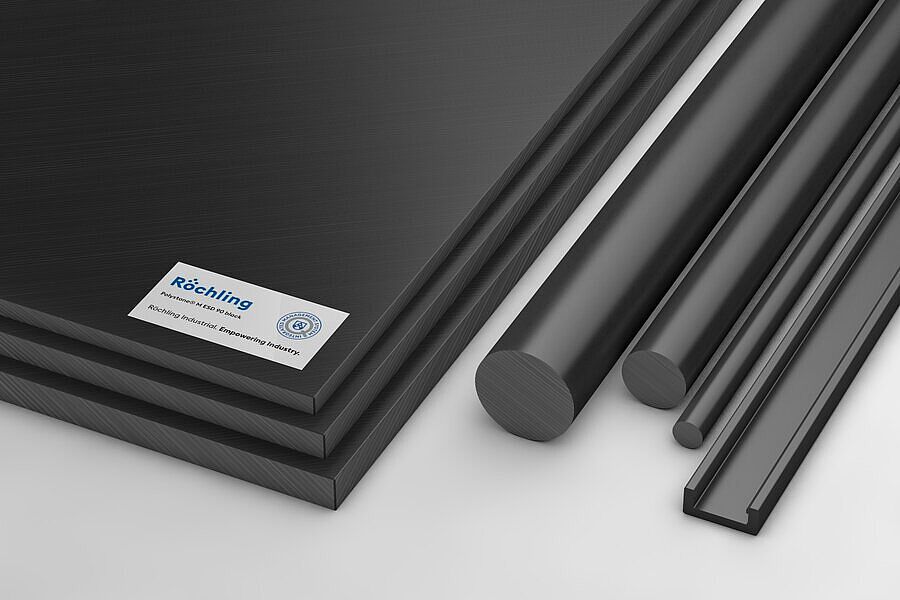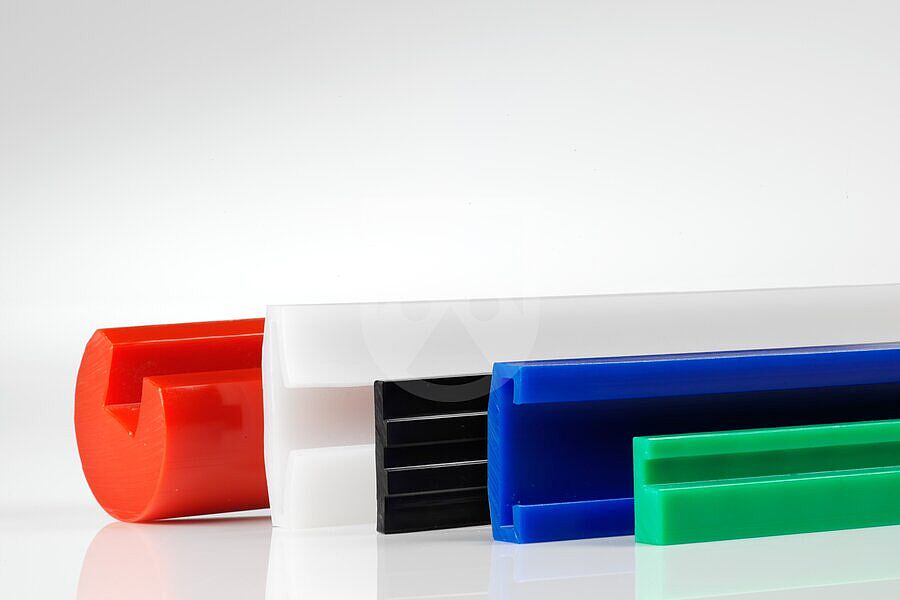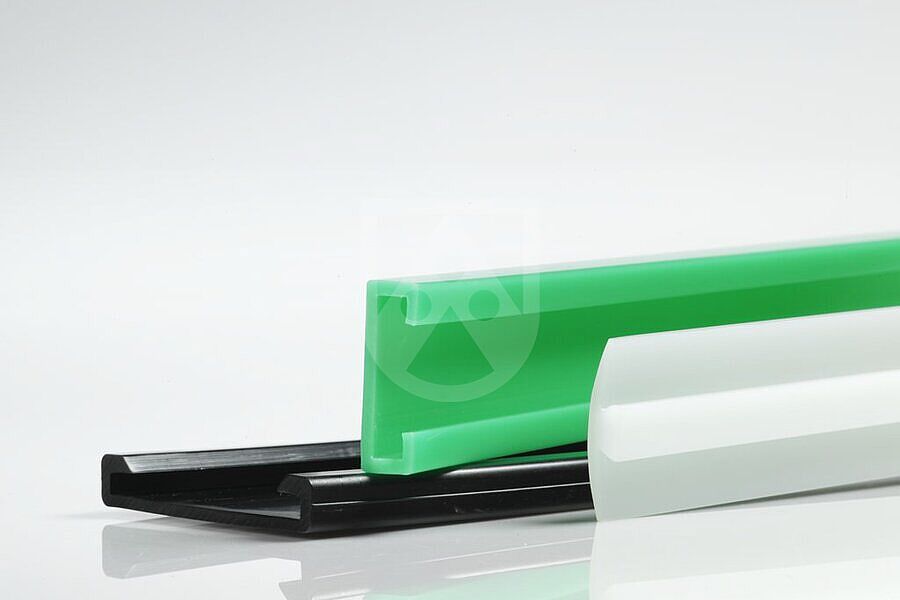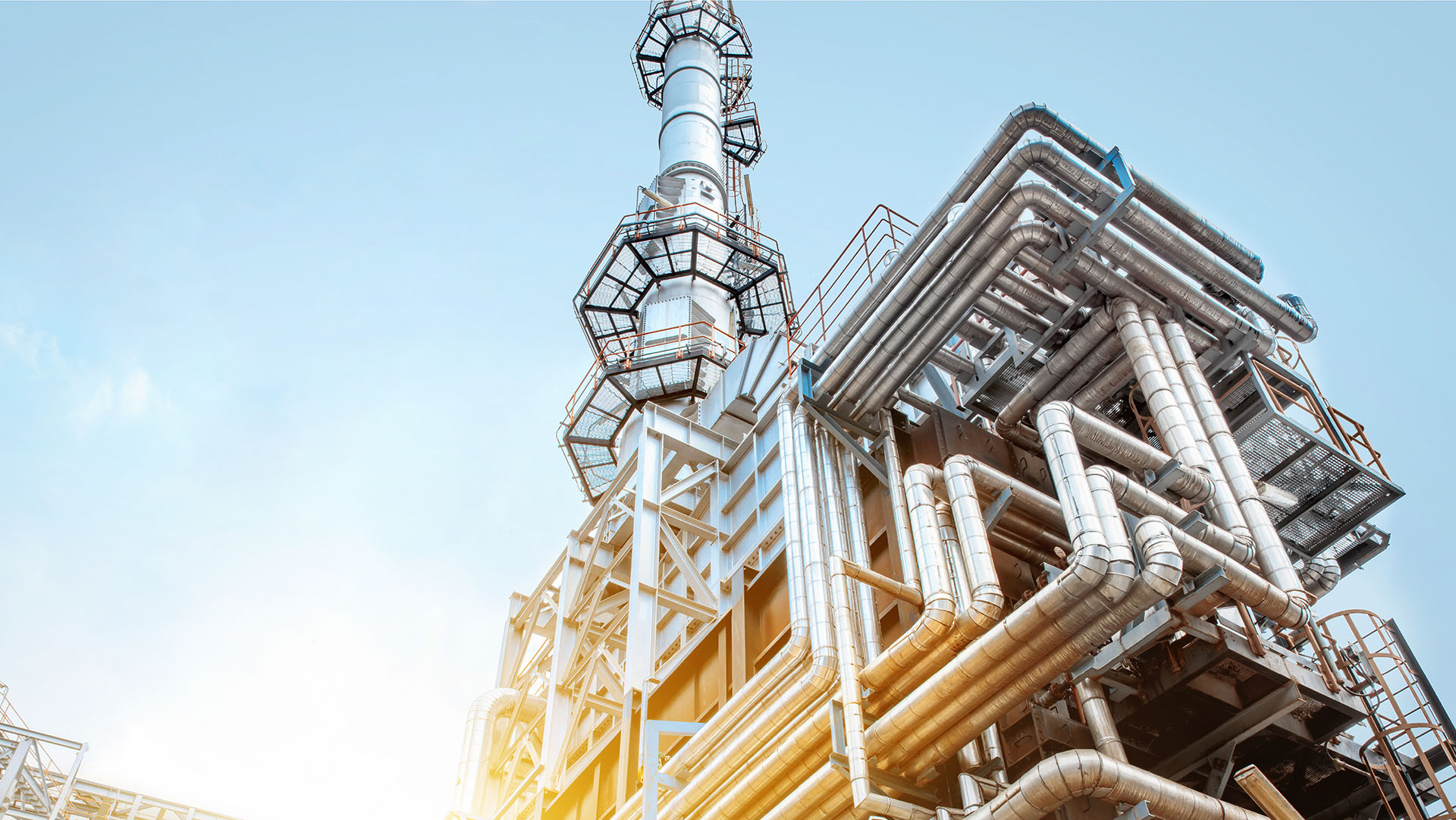Polystone® M ESD 90 black
PE — PE-UHMW - PE 1000
Polystone® M est un polyéthylène de masse moléculaire ultra haute (PE-UHMW/PE 1000), utilisée pour résoudre les problèmes de friction, d’usure et de flux-matières dans de nombreux secteurs industriels. Ce matériau se distingue par d’excellentes propriétés tde glissement, une résistance extrême à l’usure, une haute résilience ainsi qu’une excellente résistance aux produits chimiques, et s’est établi dans les applications techniques.
Characteristics
- Antistatique
- Good wear resistance
- Good impact strength
Variants
| SKU | Name | Type | Type | Color | Measurements | Length | Width | Thickness | Height | ||
|---|---|---|---|---|---|---|---|---|---|---|---|
| No stock item (MOQ) | 349429 | Polystone® M ESD 90 black pressed | plaque | plaque | noir, similaire RAL 9005 | 20 x 1000 x 2000 mm | 2 000 mm | 1 000 mm | 20 mm | ||
| No stock item (MOQ) | 379116 | Polystone® M ESD 90 black pressed | plaque | plaque | noir, similaire RAL 9005 | 12 x 1000 x 2000 mm | 2 000 mm | 1 000 mm | 12 mm | ||
| No stock item (MOQ) | 379187 | Polystone® M ESD 90 black pressed | plaque | plaque | noir, similaire RAL 9005 | 12 x 2000 x 6000 mm | 6 000 mm | 2 000 mm | 12 mm | ||
| No stock item (MOQ) | 379189 | Polystone® M ESD 90 black pressed | plaque | plaque | noir, similaire RAL 9005 | 20 x 2000 x 6000 mm | 6 000 mm | 2 000 mm | 20 mm | ||
| No stock item (MOQ) | 385311 | Polystone® M ESD 90 black pressed | plaque | plaque | noir, similaire RAL 9005 | 12 x 1000 x 2000 mm | 2 000 mm | 1 000 mm | 12 mm | ||
| No stock item (MOQ) | 400074 | Polystone® M ESD 90 black pressed | plaque | plaque | noir, similaire RAL 9005 | 10 x 2000 x 6000 mm | 6 000 mm | 2 000 mm | 10 mm | ||
| No stock item (MOQ) | 409541 | Polystone® M ESD 90 black pressed | plaque | plaque | noir, similaire RAL 9005 | 25 x 2000 x 6000 mm | 6 000 mm | 2 000 mm | 25 mm | ||
| No stock item (MOQ) | 414529 | Polystone® M ESD 90 black pressed | plaque | plaque | noir, similaire RAL 9005 | 15 x 2000 x 6000 mm | 6 000 mm | 2 000 mm | 15 mm | ||
| No stock item (MOQ) | 414674 | Polystone® M ESD 90 black pressed | plaque | plaque | noir, similaire RAL 9005 | 10 x 1000 x 2000 mm | 2 000 mm | 1 000 mm | 10 mm | ||
| No stock item (MOQ) | 414675 | Polystone® M ESD 90 black pressed | plaque | plaque | noir, similaire RAL 9005 | 15 x 1000 x 2000 mm | 2 000 mm | 1 000 mm | 15 mm | ||
| No stock item (MOQ) | 425800 | Polystone® M ESD 90 black pressed | plaque | plaque | noir, similaire RAL 9005 | 25 x 1000 x 2000 mm | 2 000 mm | 1 000 mm | 25 mm | ||
| No stock item (MOQ) | 427129 | Polystone® M ESD 90 black pressed | plaque | plaque | noir, similaire RAL 9005 | 8 x 1000 x 2000 mm | 2 000 mm | 1 000 mm | 8 mm | ||
| No stock item (MOQ) | 427245 | Polystone® M ESD 90 black pressed | plaque | plaque | noir, similaire RAL 9005 | 8 x 2000 x 6000 mm | 6 000 mm | 2 000 mm | 8 mm | ||
| No stock item (MOQ) | 429879 | Polystone® M ESD 90 black pressed | plaque | plaque | noir, similaire RAL 9005 | 35 x 1000 x 2000 mm | 2 000 mm | 1 000 mm | 35 mm | ||
| No stock item (MOQ) | 430079 | Polystone® M ESD 90 black pressed | plaque | plaque | noir, similaire RAL 9005 | 35 x 2500 x 6000 mm | 6 000 mm | 2 500 mm | 35 mm | ||
| No stock item (MOQ) | 431331 | Polystone® M ESD 90 black pressed | plaque | plaque | noir, similaire RAL 9005 | 35 x 2000 x 6000 mm | 6 000 mm | 2 000 mm | 35 mm | ||
| No stock item (MOQ) | 436613 | Polystone® M ESD 90 black pressed | plaque | plaque | noir, similaire RAL 9005 | 30 x 1220 x 2440 mm | 2 440 mm | 1 220 mm | 30 mm | ||
| No stock item (MOQ) | 436712 | Polystone® M ESD 90 black pressed | plaque | plaque | noir, similaire RAL 9005 | 30 x 2500 x 6000 mm | 6 000 mm | 2 500 mm | 30 mm | ||
| No stock item (MOQ) | 469427 | Polystone® M ESD 90 black pressed | plaque | plaque | noir, similaire RAL 9005 | 15 (-0/+0,4) x 1000 x 2000 mm | 2 000 mm | 1 000 mm | 15 mm | ||
| No stock item (MOQ) | 469535 | Polystone® M ESD 90 black pressed | plaque | plaque | noir, similaire RAL 9005 | 25 x 1250 (+/-30) x 3000 (-0/+100) mm | 3 000 mm | 1 250 mm | 25 mm | ||
| No stock item (MOQ) | 469767 | Polystone® M ESD 90 black pressed | plaque | plaque | noir, similaire RAL 9005 | 25 x 2500 x 6000 mm | 6 000 mm | 2 500 mm | 25 mm | ||
| No stock item (MOQ) | 403567 | Polystone® M ESD 90 black extruded | jonc | jonc | noir, similaire RAL 9005 | Ø 60 x 1.000 mm | 1 000 mm | 60 mm | |||
| No stock item (MOQ) | 404392 | Polystone® M ESD 90 black extruded | jonc | jonc | noir, similaire RAL 9005 | Ø 50 x 1.000 mm | 1 000 mm | 50 mm | |||
| No stock item (MOQ) | 404393 | Polystone® M ESD 90 black extruded | jonc | jonc | noir, similaire RAL 9005 | Ø 80 x 1.000 mm | 1 000 mm | 80 mm | |||
| No stock item (MOQ) | 408933 | Polystone® M ESD 90 black extruded | jonc | jonc | noir, similaire RAL 9005 | Ø 25 x 1.000 mm | 1 000 mm | 25 mm | |||
| No stock item (MOQ) | 410832 | Polystone® M ESD 90 black extruded | jonc | jonc | noir, similaire RAL 9005 | Ø 30 x 1.000 mm | 1 000 mm | 30 mm | |||
| No stock item (MOQ) | 410833 | Polystone® M ESD 90 black extruded | jonc | jonc | noir, similaire RAL 9005 | Ø 40 x 1.000 mm | 1 000 mm | 40 mm | |||
| No stock item (MOQ) | 413676 | Polystone® M ESD 90 black extruded | jonc | jonc | noir, similaire RAL 9005 | Ø 35 x 1.000 mm | 1 000 mm | 35 mm | |||
| No stock item (MOQ) | 413677 | Polystone® M ESD 90 black extruded | jonc | jonc | noir, similaire RAL 9005 | Ø 45 x 1.000 mm | 1 000 mm | 45 mm | |||
| No stock item (MOQ) | 413898 | Polystone® M ESD 90 black extruded | jonc | jonc | noir, similaire RAL 9005 | Ø 100 x 1.000 mm | 1 000 mm | 100 mm | |||
| No stock item (MOQ) | 414333 | Polystone® M ESD 90 black extruded | jonc | jonc | noir, similaire RAL 9005 | Ø 20 x 1.000 mm | 1 000 mm | 20 mm | |||
| No stock item (MOQ) | 414669 | Polystone® M ESD 90 black extruded | jonc | jonc | noir, similaire RAL 9005 | Ø 150 x 1.000 mm | 1 000 mm | 150 mm | |||
| No stock item (MOQ) | 418427 | Polystone® M ESD 90 black extruded | jonc | jonc | noir, similaire RAL 9005 | Ø 70 x 1.000 mm | 1 000 mm | 70 mm | |||
| No stock item (MOQ) | 427677 | Polystone® M ESD 90 black extruded | jonc | jonc | noir, similaire RAL 9005 | Ø 65 x 1.000 mm | 1 000 mm | 65 mm | |||
| No stock item (MOQ) | 439926 | Polystone® M ESD 90 black extruded | jonc | jonc | noir, similaire RAL 9005 | Ø 180 x 1.000 mm | 1 000 mm | 180 mm | |||
| No stock item (MOQ) | 458267 | Polystone® M ESD 90 black extruded | jonc | jonc | noir, similaire RAL 9005 | Ø 60 x 2.000 mm | 2 000 mm | 60 mm | |||
| No stock item (MOQ) | 466392 | Polystone® M ESD 90 black extruded | jonc | jonc | noir, similaire RAL 9005 | Ø 150 x 2.000 mm | 2 000 mm | 150 mm | |||
| No stock item (MOQ) | 466393 | Polystone® M ESD 90 black extruded | jonc | jonc | noir, similaire RAL 9005 | Ø 200 x 2.000 mm | 2 000 mm | 200 mm | |||
| No stock item (MOQ) | 466394 | Polystone® M ESD 90 black extruded | jonc | jonc | noir, similaire RAL 9005 | Ø 130 x 2.000 mm | 2 000 mm | 130 mm | |||
| No stock item (MOQ) | 468661 | Polystone® M ESD 90 black extruded | jonc | jonc | noir, similaire RAL 9005 | Ø 130 x 1.000 mm | 1 000 mm | 130 mm | |||
| No stock item (MOQ) | 468663 | Polystone® M ESD 90 black extruded | jonc | jonc | noir, similaire RAL 9005 | Ø 110 x 1.000 mm | 1 000 mm | 110 mm | |||
| No stock item (MOQ) | 473497 | Polystone® M ESD 90 black extruded | jonc | jonc | noir, similaire RAL 9005 | Ø 140 x 2.000 mm | 2 000 mm | 140 mm |
Technical Specifications Polystone® M ESD 90 black
| Test Method | Unit | Guideline Value | |
|---|---|---|---|
| Densité | DIN EN ISO 1183-1 | g / cm3 | >0,94 |
| Water absorption | DIN EN ISO 62 | % | 0,01 |
| Flammability (Thickness 3 mm / 6 mm) | UL 94 | HB | |
| Molecular weight | - | 106 g/mol | ∼ 9 |
| Test Method | Unit | Guideline Value | |
|---|---|---|---|
| Yield stress | DIN EN ISO 527 | MPa | >20 |
| Elongation at break | DIN EN ISO 527 | % | >50 |
| Tensile modulus of elasticity | DIN EN ISO 527 | MPa | >700 |
| Notched impact strength | DIN EN ISO 11542 | kJ / m2 | >50 |
| Shore hardness | DIN EN ISO 868 | scale D | >63 |
| Test Method | Unit | Guideline Value | |
|---|---|---|---|
| Melting temperature | ISO 11357-3 | °C | 130 ... 135 |
| Thermal conductivity | DIN 52612-1 | W / (m * K) | 0,40 |
| Thermal capacity | DIN 52612 | kJ / (kg * K) | 1,90 |
| Coefficient of linear thermal expansion | DIN 53752 | 10-6 / K | 150 ... 230 |
| Service temperature, long term | Average | °C | -150 … 80 |
| Service temperature, short term (max.) | Average | °C | 130 |
| Vicat softening temperature | DIN EN ISO 306, Vicat B | °C | 79 |
| Test Method | Unit | Guideline Value | |
|---|---|---|---|
| Surface resistivity | DIN EN 62631-3-2 | Ω | 106 ... 109 |







